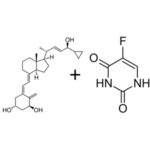 Researchers from the Washington University School of Medicine and Harvard Medical School have shown that a combination of 2 topical drugs can trigger an immune response against precancerous skin lesions. The study was published yesterday in The Journal of Clinical Investigation.
Researchers from the Washington University School of Medicine and Harvard Medical School have shown that a combination of 2 topical drugs can trigger an immune response against precancerous skin lesions. The study was published yesterday in The Journal of Clinical Investigation.
The 2 drugs, calcipotriol and 5-fluorouracil, have been in use for years – topical 5-fluorouracil is prescribed to treat actinic keratosis. Calcipotriol is indicated by the FDA for psoriasis, an autoimmune disorder that presents with red, scaly patches of skin. The research team combined the 2 drugs and evaluated the combination’s efficacy against actinic keratosis, a precursor to squamous cell carcinoma.
“We looked at pre-cancerous lesions on patients with sun-damaged skin,” study co-author Dr. Lynn Cornelius said in prepared remarks. “Most commonly found on the face, scalp and arms, these lesions appear abnormal by visual examination and under the microscope but are not full-blown skin cancers. But because these lesions have the potential to develop into a true skin cancer, they are commonly treated. Our study shows this combination therapy is more effective and better tolerated than current treatment practices.”
Past studies in mice prone to eczema rash have shown that those mice are also resistant to developing skin cancer. The over-reactive immunity triggered by damaged skin may also result in a hyper-vigilant immune system that will attack any cancerous cells, the team hypothesized. Earlier work demonstrated that a protein, TSLP, in the skin activates the immune system’s T cells, which subsequently attack tumor cells. Previous work has also shown that calcipotriol causes the skin to produce TSLP.
“The idea behind this study was to induce a heightened immune response in the skin using calcipotriol combined with the 5-fluorouracil that works to destroy the precancerous cells,” Cornelius said. “In so doing, the destroyed precancerous cells release cell proteins, or antigens, and facilitate the heightened immune system to respond. We compared the 2-drug formulation to 5-fluorouracil alone over a shorter application period – 4 days as opposed to 2 to 4 weeks that is typical for the standard treatment of 5-fluorouracil alone.”
The team enrolled 132 patients with actinic keratosis and 65 of them received the investigational drug combination, while the control group received 5-fluorouracil plus Vaseline. Participants applied the topical drugs twice daily for 4 days.
At the conclusion of the study, facial lesions were reduced by 88% in the investigational arm compared to 26% of the control group. Lesions on the scalp were reduced by 76% for the group that received the drug combination, compared to 6% of the control. Similarly, lesions on the right and left arm were significantly lessened in the investigational group versus the control.
“Because calcipotriol has been shown to induce an immune response, we are now interested in seeing if the anti-tumor immunity of the activated T cells can be recalled later to help prevent both precancerous and cancerous skin lesions,” Cornelius said. “We are now planning to re-contact our patients to determine whether there are differences in precancerous and skin cancer rates between the two treatment groups.”

